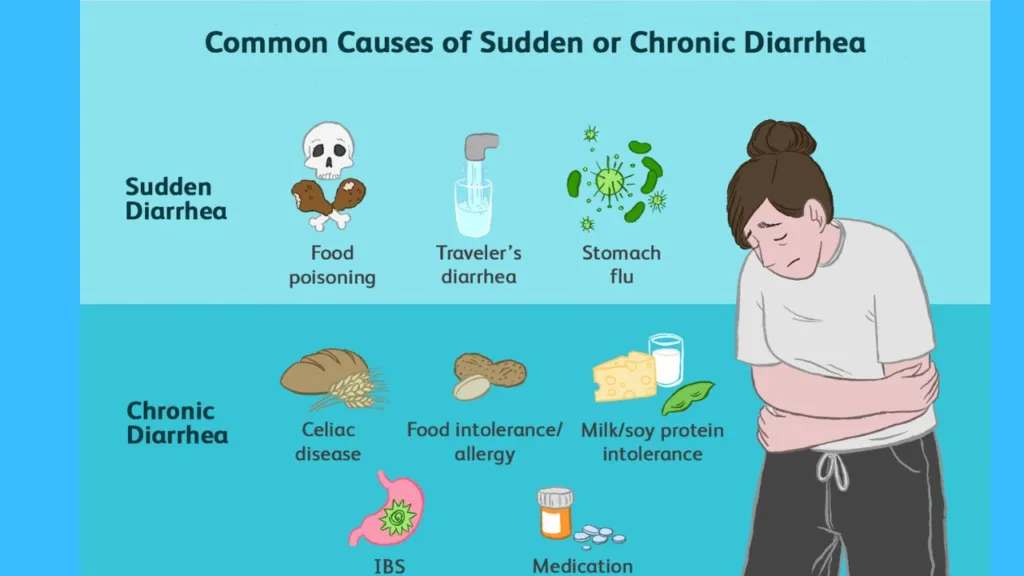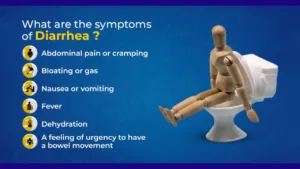
Today we will talk about diarrhea homeopathy treatment and its easy causes.
Introduction: Diarrhea (Homeopathy)
Table of Contents
In today’s fast-paced world, digestive discomforts like diarrhea can disrupt our daily routines and hinder our overall well-being. While conventional medicine offers effective treatments, some individuals seek alternative remedies such as homeopathy. Homeopathy, founded on the principle of “like cures like,” harnesses the body’s innate healing abilities. Let’s delve into the world of homeopathy and its potential for managing diarrhea.
Cuases of Diarrhea
Diarrhea can be caused by a variety of factors, ranging from infections to dietary habits to underlying health conditions. Some common causes of diarrhea include:
1. Viral Infections: Viruses such as norovirus, rotavirus, and adenovirus can lead to viral gastroenteritis, often referred to as the stomach flu. These infections are highly contagious and can cause diarrhea, vomiting, fever, and abdominal cramps.
2. Bacterial Infections: Bacteria such as Salmonella, Escherichia coli (E. coli), Campylobacter, and Shigella can contaminate food or water, leading to bacterial gastroenteritis. Symptoms include diarrhea, abdominal pain, fever, and sometimes bloody stools.
3. Parasitic Infections: Parasites like Giardia lamblia and Cryptosporidium can cause diarrhea when ingested through contaminated food or water. These infections, known as parasitic gastroenteritis, can also lead to symptoms such as abdominal cramps, bloating, and weight loss.
4. Food Poisoning: Consuming contaminated food or beverages containing toxins produced by bacteria like Staphylococcus aureus or Bacillus cereus can result in food poisoning, characterized by diarrhea, nausea, vomiting, and abdominal cramps.
5. Medications: Some medications, particularly antibiotics, can disrupt the balance of bacteria in the intestines, leading to antibiotic-associated diarrhea. Other medications such as certain antacids, cancer drugs, and laxatives may also cause diarrhea as a side effect.
6. Dietary Factors: Certain dietary factors can trigger diarrhea, including consuming large amounts of high-fiber foods, spicy foods, fatty foods, or artificial sweeteners. Intolerance or sensitivity to lactose (found in dairy products) or gluten (found in wheat and other grains) can also lead to diarrhea.
7. Traveler’s Diarrhea: Traveling to regions with poor sanitation or unsafe drinking water can increase the risk of developing traveler’s diarrhea, typically caused by ingesting contaminated food or water. Symptoms include diarrhea, abdominal cramps, nausea, and fever.
8. Stress and Anxiety: Emotional stress or anxiety can sometimes trigger diarrhea or exacerbate existing gastrointestinal conditions such as irritable bowel syndrome (IBS).
9. Underlying Medical Conditions: Certain medical conditions can cause chronic or recurring diarrhea, including irritable bowel syndrome (IBS), inflammatory bowel disease (IBD) such as Crohn’s disease or ulcerative colitis, celiac disease, and chronic pancreatitis.
10. Surgery or Digestive Disorders: Surgeries involving the digestive system, such as gastric bypass surgery, can sometimes lead to diarrhea as a complication. Digestive disorders such as bile acid malabsorption or pancreatic insufficiency can also cause chronic diarrhea.
It’s important to identify the underlying cause of diarrhea to determine the appropriate treatment and management strategies. Persistent or severe diarrhea should be evaluated by a healthcare professional to rule out serious conditions and prevent complications such as dehydration.
Symptoms of Diarrhea:
Diarrhea is a common digestive disorder characterized by loose, watery stools occurring more frequently than usual. Symptoms of diarrhea can vary depending on the underlying cause and severity but typically include:
1. Loose, watery stools: Diarrhea often presents with stools that are loose, watery, and may have an increased frequency of bowel movements.
2. Abdominal cramps: Many individuals with diarrhea experience abdominal cramping or discomfort, which can range from mild to severe.
3. Urgency: There is often a sudden and urgent need to have a bowel movement, which can be difficult to control.
4. Bloating and gas: Diarrhea may be accompanied by bloating and increased gas production, contributing to abdominal discomfort.
5. Nausea and vomiting: Some individuals may also experience nausea and vomiting, particularly if the diarrhea is caused by an infection or gastrointestinal illness.
6. Fever: In cases of infectious diarrhea, fever may be present, indicating an inflammatory response in the body.
7. Dehydration: Prolonged or severe diarrhea can lead to dehydration, characterized by symptoms such as thirst, dry mouth, decreased urine output, and fatigue.
8. Blood or mucus in stools: In certain cases, diarrhea may contain blood or mucus, which can indicate inflammation or infection in the digestive tract.
9. Weakness and fatigue: Dehydration and electrolyte imbalances associated with diarrhea can cause weakness, fatigue, and overall malaise.
10. Loss of appetite: Diarrhea may lead to a decreased appetite or aversion to food due to discomfort and nausea.
It’s important to note that the severity and duration of diarrhea symptoms can vary widely depending on the underlying cause, individual factors, and any accompanying medical conditions. If diarrhea persists for more than a couple of days, is accompanied by severe symptoms such as high fever or bloody stools, or if dehydration is a concern, it’s essential to seek medical attention promptly for proper evaluation and treatment.
Homeopathy and its Principles:
Homeopathy operates on the principle of treating “like with like” and individualizing treatments based on a person’s unique symptoms. Remedies are highly diluted substances derived from plants, minerals, or animals, aiming to stimulate the body’s self-healing mechanisms without side effects.
Common Diarrhea Homeopathy Medicine:
In diarrhea homeopathy medicine work very well to treat a mild, gentle cure.
1. Arsenicum album: Suitable for diarrhea accompanied by anxiety, restlessness, and burning sensations in the stomach.
2. Podophyllum: Useful for profuse, gushing diarrhea, often associated with cramping and weakness.
3. Aloe: Indicated for diarrhea with urgency, rumbling in the abdomen, and the sensation of something moving inside.
4. Nux vomica: Helpful for diarrhea triggered by overeating, alcohol, or spicy foods, accompanied by irritability and sensitivity to noise and light.
5. Sulphur: Effective for diarrhea with burning sensations, particularly in the anus, and aggravated by warmth.
6. Chamomilla: Beneficial for diarrhea in infants or during teething, accompanied by irritability and colic-like pains.
Consultation with a Homeopath:
Individuals seeking homeopathic treatment for diarrhea should consult a qualified homeopath. During the consultation, the homeopath will assess the individual’s overall health, symptoms, and lifestyle factors to prescribe a tailored remedy.
Adjunctive Measures:
Alongside homeopathic remedies, individuals can adopt supportive measures to manage diarrhea effectively. These include maintaining hydration with electrolyte-rich fluids, following a bland diet, avoiding triggers such as caffeine and fatty foods, and getting adequate rest.
Conclusion:
Homeopathy offers a gentle and holistic approach to managing diarrhea, addressing not only the symptoms but also the underlying imbalances in the body. While research on homeopathy’s efficacy for diarrhea is limited, many individuals report positive outcomes. However, it’s essential to approach homeopathic treatment as a complementary option and seek guidance from a qualified practitioner. By integrating in diarrhea homeopathy with lifestyle modifications, individuals can achieve symptomatic relief and support their overall well-being in the journey toward digestive health.





